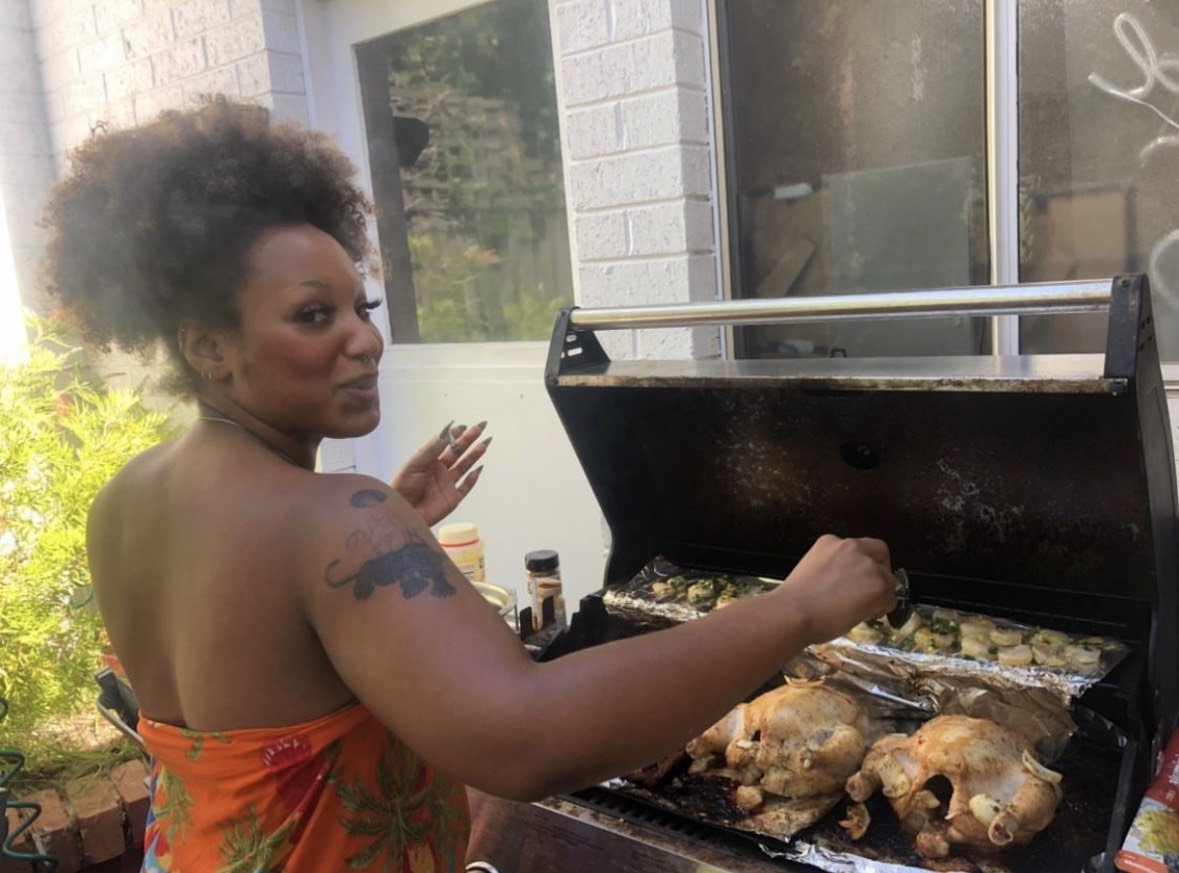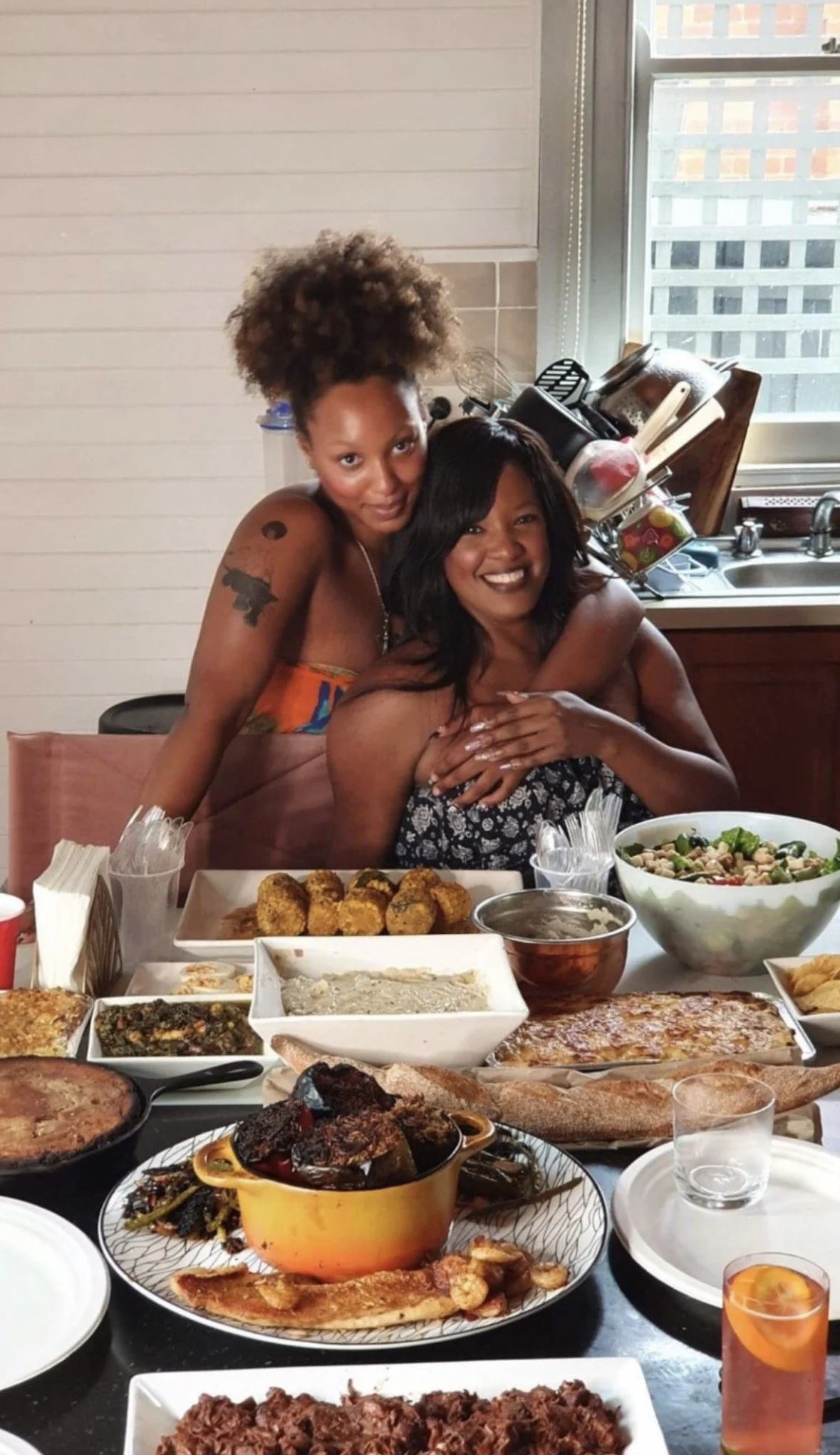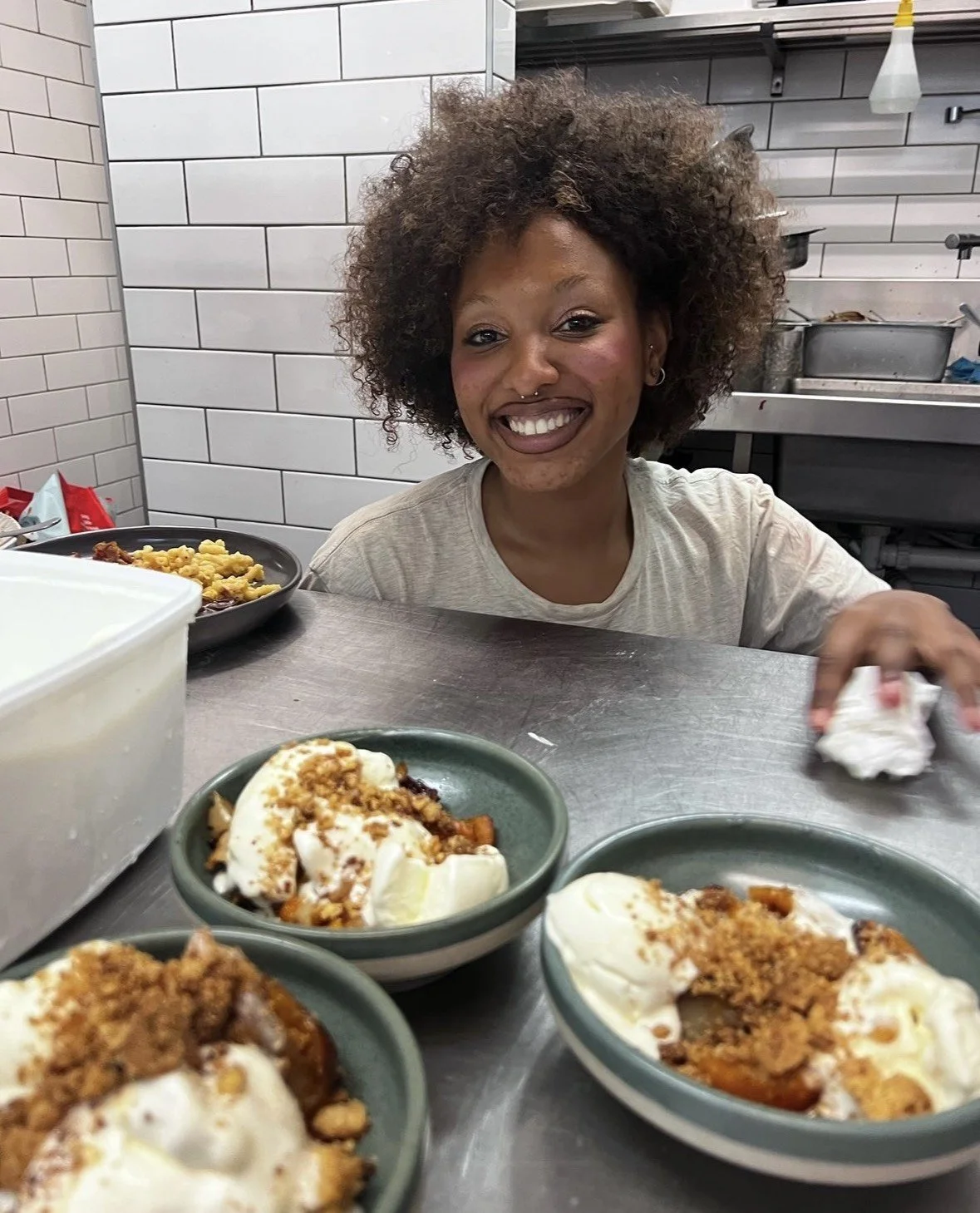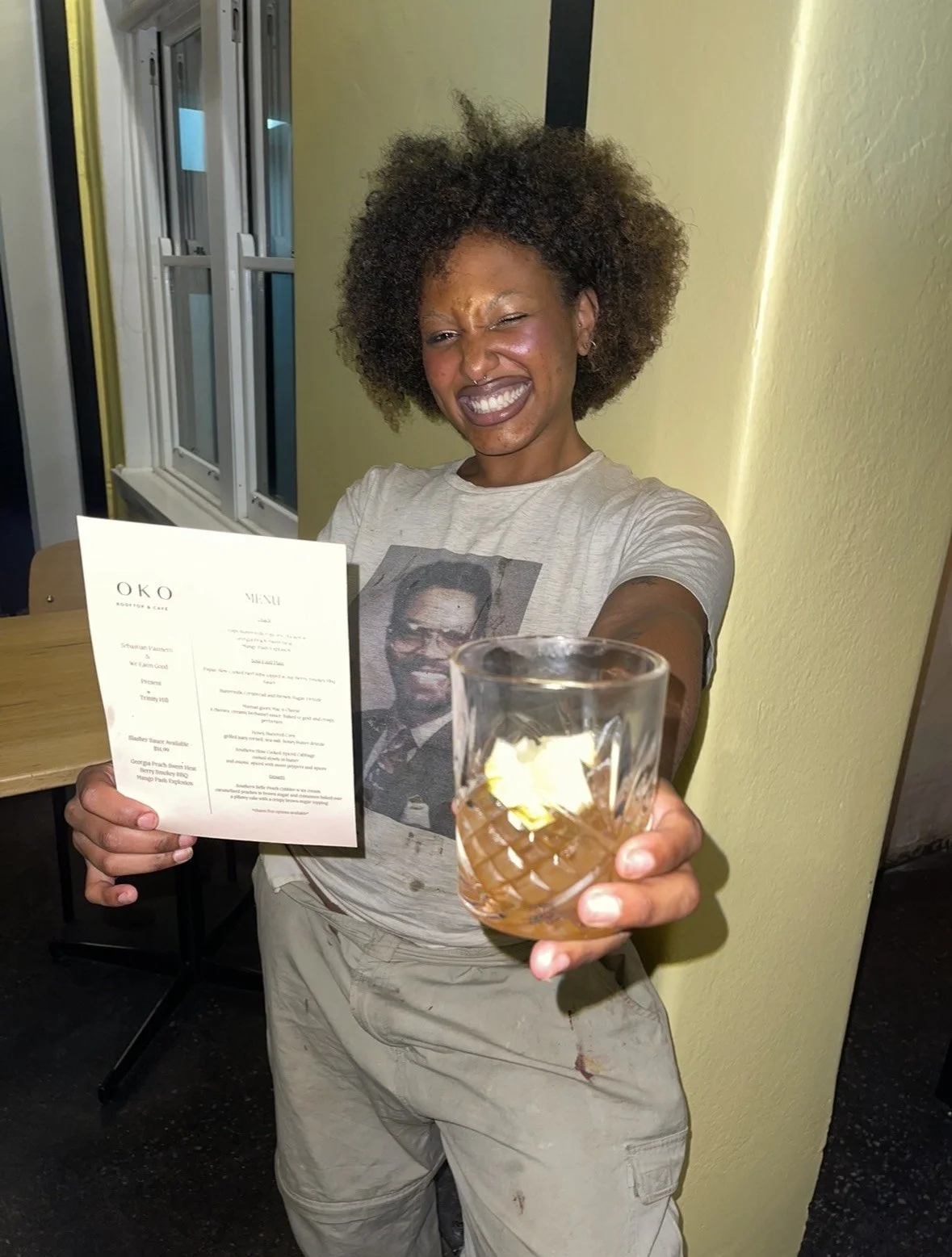Soul Food and American Barbecue
Image description: Trinity’s back is to the camera as she looks over her shoulder. She stands outdoors with an arm hovering over the open barbecue which is layered with whole chickens and potatoes. Photograph: Trinity Hill.
Words by Kanika Chopra.
American barbecue and soul food were something I’d only heard about in songs, on TV, and in other forms of media until We Eatin’ Good’s Queer Pop-Up Chef series at Oko Café in Fitzroy. As a part of this series, they featured Trinity Hill, an African American make-up artist, creative and cook with a passion to share her heritage with people through soul food and barbecue that was passed down to her from her nana and grandfather.
I’d always known soul food and American barbecue to be foods that originated in the southern states of the U.S., but I was curious about their origins. Research told me that Spanish colonists found a group of Indigenous peoples — Taino-Arawak and Caribbean natives—slow-cooking meats with smoke. Native Americans called this process of slow-cooking meat over a wooden platform barbacoa. According to records, they used green wood to smoke meat over indirect heat. This method took up to 12 hours to cook the meat through, but it made the protein far more juicy and tender. A process that was once frowned upon by colonists and referred to as ‘barbaric’ was eventually adopted by them, and over time it became a part of American culture. Later on, due to white America’s history involving the slave trade, all cooking duties fell on the shoulders of enslaved African people. Contrary to what a lot of mainstream U.S. media would suggest, Indigenous and African-American people made barbecue what it is today.
Barbecue was popularised in the South in around the mid-1700s and by the 1830s ‘In order to have legit barbecue, it was thought, an African American cook and his crew were necessary and barbecue was understood to be a Black experience.’
Another vital cuisine of the black experience in the U.S. is soul food, but what does soul food mean? Before I looked into it, I asked Trinity. ‘I call it soul food,’ she said, ‘ And I guess for me, it's not just the fact that it's like coming from me, but the fact that it highlights my culture and my memories. It's the feeling I get when I'm cooking it and what I feel at each meal. When you're eating it you feel a part of my soul, and that's what makes it “soul food” for me. It's the meals that when I wasn't at my nana's house for months, I couldn't wait to sit there and eat them because they made me feel complete.’
Trinity said her family is from Alabama, which is one of the main places where soul food came to be. Other places where soul food came to be include Georgia and Mississippi. These are also the states that had the highest populations of enslaved people. Enslaved people in the U.S. were provided with limited food rations that were poor in quality and not very nutritious. A lot of the traditional rations that were initially provided to enslaved people were pork and cornmeal, through which cornbread, battered meats, and pork with vegetables (collard greens) came to be. There was also a prominent influence of African cooking in soul food, specifically from the African savanna and the tropical regions of West and Central Africa. One of the reasons soul food feels very rich and heavy is because it was intended to be that way, as the people who consumed these meals needed high-calorie food to do the physical labour that they had to. The term "soul food” was popularised in the 1960s and 1970s with the rise of the Black Power movement. One of the earliest texts using the term "soul food” is The Autobiography of Malcolm X, which was published in 1965.
Image description: Trinity stands, with her arm over a smiling friend who is sitting down. In front of them both is a table covered in different dishes full of food. Photograph: Trinity Hill.
Trinity’s nana and grandfather grew up in the same country town in Alabama, not too far away from each other, and you could see her roots represented on the plate she served at the pop-up. There was cornbread, buttered corn, and beef ribs, among other newer additions that came to be a part of soul food culture as it evolved; like macaroni and cheese. It was such a privilege to be a part of that dining experience. When our plates came out, it felt like a generous home-cooked meal, which was so delicious and comforting that the entire room fell silent as we ate.
After that meal, I just had to know what meals Trinity had at home. It turns out that if it was a Sunday night, Trinity said, ‘There's always going to be fried chicken, mashed potatoes, mac and cheese and my nana's buttermilk biscuits with extra butter. One of her favourite things that I love that I haven't had a lot of people try here yet because it's very Southern is called Country Fried Steak. It's like a very thin steak that's kind of beaten down a little bit, covered in corn starch, fried a little bit, and then a gravy is made that sits on top of mashed potatoes. It was one of my absolute favourite things Nana has ever made for me. It's just, I don't know, it's very rich and intense, but it's one of the most flavourful, just creamy and comforting meals I'll ever eat.’
Trinity also made it a point to let me know that "if it's a cookout and it's a Saturday during the day. Then my nana's got barbecue-like jerk chicken on…Pop is always on the grill making his baby back ribs that he's been soaking in his brine and they always have Coke in them. My nana will make a coleslaw that kind of has a bit of fruit in it as well. Like apples and raisins and then potato salad…My pop’s ribs, though, have always been like our famous barbecue moment. There's nothing like them and that's why I try and replicate them every time I cook.’
Do you think you got close? — I had to ask since I’d tried them and absolutely loved them.
‘I think I love my ribs and I think they're great, but I will never say that they are [as good as] his…I'm so in awe of my grandparents, what their food means to me, and what they mean to me. I've just always looked at them with such starry eyes… And just like, it will never be that taste, that bite, but my bite [ribs]… will always be mine.’
Trinity grew up in Atlanta and spent all her summers in Alabama. One would imagine the barbecue would be a bit different. ‘In Atlanta, my mum took over a little bit more. That was more when we would…experiment with burgers and skewers, and pork ribs. So that was a lot of fun. And I also experimented more with marinating…I think my dad learned a lot from my grandfather. When we were at home and we were just doing our barbecues, he would spend the whole day or the [previous] night marinating his meats, which I really enjoyed… Watching that process…When my dad was out there barbecuing, he had records playing. My mum was in the kitchen seasoning it up, throwing the food out there…kind of like a little rotation: throwing seasonings, putting the oil on, foiling up the chicken or the fish or whatever, and putting it on. And that was always so cool…I also think there was a lot more like char peeling of veggies…[through that] I had a lot more love for vegetables, which I appreciate.’
Image description: Trinity crouches at the kitchen pass. A stainless steel bench (the pass) in front of her is littered with matching plates holding food she has just cooked. Photograph: Trinity Hill.
Has living in different places influenced your barbecuing differently?
‘You know, I would say when you're going to Alabama, you'll see fried things a little bit more. Whereas Georgia will have that smoked barbecue a little bit more. So you'll see the smoked wings, the smoked chicken legs, turkey legs and sausage links. And I love that stuff too…or brisket, that's a lot more Georgia. That's something I learned from eating barbecue in Atlanta and then being like, I wanna learn how to do this where I didn't have that at Nana and Papa's…And then when I came here, I guess my love for food ignited even more because I just wanted more knowledge and my connection [to my roots] to be deeper...So I always like talking to Nana on the phone more or reading more Southern cookbooks.’
What challenges have you faced with cooking these meals here?
‘When I first moved here, for both my mum and I, not being able to have access to some of the spices that we have at home was really hard. So we have, like Creole seasonings, Lawry's Seasoning Salt, which is an all-purpose seasoning. It has a bunch of different spices. Old Bay, which is great for your fish... On my dad's side, I'm also Puerto Rican, so like Saison, which is a South American spice that's very good for Spanish food…even just things like Chipotle chilies, like [these] things were harder to find. I found dried chillies that we use a lot at home. Cornmeal, real corn tortillas…We use Chrisco, which is like solidified lard. That is a really good way to fry your chicken…and that took us, I think, maybe two years of living here before we found an American store that had these spices and had these things. Or we would literally have to order them from Walmart in the States and wait a month or so for them to come…Or try and get our family to ship us stuff because even though we felt like we had luxuries like Queen Vic Market and South Melbourne Market, where we didn't have that as much in Atlanta, and that was really cool, but we were missing out on the things that made it feel more ethnic—having more flavour and having more [of our] own spices. We were missing us.’
What are some barbecue staples that you would say would render a meal incomplete if they weren't at the table?
For me, [specifically] cornbread. I think if it's not ribs, it has to be brisket. You have to have red meat on there for me…But I get that some people don't like ribs, and I think you can feed more with brisket or whatever. So I think there has to be red meat…I think some people like potato salad or slaw, but I feel like there has to be mac and cheese… It doesn't feel right [to me] without having something warm on the side that's just gooey and a sauce; there needs to be sauce. Those are my barbecue must-haves.’
There’s also this debate within barbecuing that if it’s good enough, you don’t need sauce. What do you think about this notion?
Image description: Trinity stands smiling, one arm is outreached with a cocktail in hand towards the camera, and the other holds a menu from her pop-up at Oko Cafe. Photograph: Trinity Hill.
‘A lot of people feel like, you know when you have a steak just put salt and pepper and nothing else, or don't put butter…Sorry, I don't feel that way…I don't feel like it's just great in its own juices…I feel like it's adding that loving and these two pair together so well why not have them have a love story?’
Do you think the sauce vs. no sauce argument is cultural?
‘I think there's a demographic of white people who are like slow cookers or barbecue cookers…pitmasters, who love a dry rub. And they feel like their meat is enough with just the dry rub. I feel like there's something that happens when you squeeze lime over fruit, [similar to] that when you have the zestiness and the power of a sauce on top of like whatever spices that have been baking this meat in, they [get] electrified. You need it. You get it and your tongue is so much more satisfied in that sense rather than just having one sharp flavour bomb. And who knows if that one piece [of meat] is gonna be as juicy as the other…And what if you just have something dry and spicy? Then it's not fun…I feel like all of my favourite times eating ribs or barbecue are when I have sauce on my face and my fingers…feeling like this is so good. I don't care that I'm making a mess.’
Sources:
https://www.felixsbbq.com/celebrating-black-history-foods/
https://firstwefeast.com/eat/2015/08/an-illustrated-history-of-soul-food
https://hempandfork.com/the-beginners-guide-to-the-history-of-soul-food/?v=1d20b5ff1ee9




